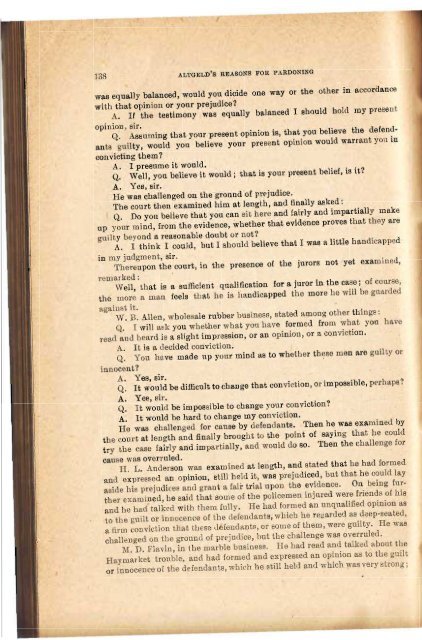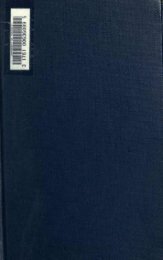The Chicago Martyrs by John P. Altgeld
The Chicago Martyrs by John P. Altgeld
The Chicago Martyrs by John P. Altgeld
Create successful ePaper yourself
Turn your PDF publications into a flip-book with our unique Google optimized e-Paper software.
138<br />
ALTGELD'S REASONS FOR PARDONING,<br />
was equally balanced, would you dicide one way or the other in accordance<br />
with that opinion or your prejudice?<br />
A. If the testimony was equally balanced I should hold my present<br />
opinion, sir. .<br />
Q. Assuming that your present opinion is, that you beheve the defen~.<br />
ants guilty, would you believe your present opinion would warrant you III<br />
convicting them?<br />
A. I presume it would.<br />
Q. Well, you believe it would; that is your present belief, is it?<br />
A. Yes, sir.<br />
He was challenged on the ground of prejudice.<br />
<strong>The</strong> court then examined him at length, and finally asked: ..<br />
I Q. Do you believe that you can sit here and fairly and impartIally make<br />
up your mind, from the evidence, whether that evidence proves that they are<br />
guilty beyond a reasonable doubt or not? .'<br />
A. I think I could, but I should believe that I was a lIttle handlCapped<br />
in my judgment, sir. . .<br />
<strong>The</strong>reupon the court, in the presence of the Jurors not yet examllled,<br />
remarked:<br />
Well that is a sufficient qualification for a juror in the case; of course,<br />
the mor; a man feels that he is handicapped the more he will be guarded<br />
against it. .<br />
W. B. Allen, wholesale rubber business, stated among other thmgs:<br />
Q. I will ask you whether what you have formed from :vh~t you have<br />
read and heard is a slight impression, or an opinion, or a convlCtlOn.<br />
A. It is a decided conviction. .<br />
Q. You have made up yonr mind as to whether tbese men are gUIlty or<br />
innocent?<br />
A. Yes, sir.<br />
Q. It would be difficult to change that conviction, or impossible, perhaps.?<br />
A.<br />
Q.<br />
Yes, sir.<br />
It would be impossible to change your conviction? _<br />
A It would be hard to change my conviction.<br />
H~ was challenged for cause <strong>by</strong> defendants. <strong>The</strong>n he was examined <strong>by</strong><br />
the court at length and finally brought to the point of saying that he could<br />
try the case fairly and impartially, and would do so. <strong>The</strong>n the challenge for<br />
cause was overruled.<br />
H. L. Anderson was examined at length, and stated that he had formed<br />
and expressed an opinion, still held it, was prejudice?, but that he c?uld lay<br />
aside his prejudices and grant a fair trial upon the ~v~dence. On. belDg fu:,<br />
ther examined, he said that some of the policemen lDJured wer.e frJen~s ~f hIS<br />
and he hact" talked with them fully. He had formed an unqualIfied oplDlOn as<br />
to the guilt or innocence of the defendants, which he regarded as.deep-seated,<br />
a firm conviction that these Jefendants, or some of them, were gUIlty. He was<br />
challenged on the ground of prejudice, but the challenge was overruled.<br />
M. D. Flavin, in the marble business. He had read and talked about the<br />
Ha market trouble, and had formed and expressed an opinion as to the guilt<br />
or innocence of the defendants, which he still held and which was very strong;<br />
FIELDEN, NEEBE AND SCHWAB••<br />
139<br />
further, that one of the officers killed at the Haymarket was a relative of bis,<br />
although the relationship was distant, but on account of this relationship his<br />
feelings were perhaps different from what they would have been, and occa<br />
.siam,d a very strong opinion as to the guilt of the defendants, and that he had<br />
ostated to others' that h@ believed what he had heard and read about the mat,<br />
ter. He was challenged on the ground of prejudice, and then stated, in answer<br />
to a question from the prosecutiou, that he believed that he could !!ive a fair<br />
and impartial verdict, when the challenge was overruled.<br />
Rush Harrison, in the silk department of Edson Keith & Co., was examined<br />
at length; stated that he had a deep-rooted conviction as to the guilt or<br />
innocence of the defendants. He said:<br />
"It would have considerable weigbt with me if selected as a juror. It is<br />
pretty deep-rooted, that opinion is, and it would take a large preponderance<br />
of evidence to remove it; it would require the preponderance of evidence to<br />
remove the opinion I now possese. I feel like every other good citizen does.<br />
I feel that these men are guilty; we don't know which; we have formed this<br />
opinion <strong>by</strong> general reports from the newspapers. ~ow, with that feeling, it<br />
would take some very positive evidence to make me think these men were<br />
not guilty, if I should acquit them; that is what I mean. I should act entirely<br />
upon the testimony; I would do as near as the main evidence would permit<br />
me to do. Probably I would take the testimony alone." ,<br />
Q. But you say that it would take positive evidence of their innocence<br />
before you could consent to return them not guilty.<br />
A. Yes, I should want some strong evidence.<br />
Q. Well, if that strong evidence of their innocence was not introduced,<br />
then you want to convict them, of course.<br />
A. Certainly.<br />
He was then challenged on the ground of being prejudiced, when the<br />
judge proceeded to interrogate him and finally got him to say that he believerl<br />
he could try the case fairly on the evidence alone; then the challenge was<br />
overruled.<br />
J. R. Adams, importer, testified that be was prejudiced; had formed and<br />
expressed opinions and still held them. He was challenged on this ground,<br />
when the court proceeded to examine him at length, and finally asked him<br />
this que5tion :<br />
Q. Do you believe that your convictions as to what the evidence proved,<br />
or failed to prove, will be at all affected <strong>by</strong> what anybody at all said or wrote<br />
about the matter before?<br />
A. I believe they would.<br />
<strong>The</strong> court (in the hearing of other jurors not yet examined) exclaimed:<br />
"It is incomprehensible to me." <strong>The</strong> juror was excused.<br />
B. L. Ames, dealer in hats and caps, stated that he was prejudiced; had<br />
formed and expressed opinioDs; still held tbem. He was challenged on these<br />
grounds. <strong>The</strong>n the court examined him at length; tried to force him to say<br />
that he coulc! try the case fairly, without regard to his prejudice, but he pereistell<br />
in Haying, in answer to the court's que.a.tions, that he did not believe<br />
Un\t lie ('uuld sit as a juror, listen to the evidence and from that alone make<br />
lip his mind as to the guilt or innocence of the defendants. <strong>The</strong>reupon the
















